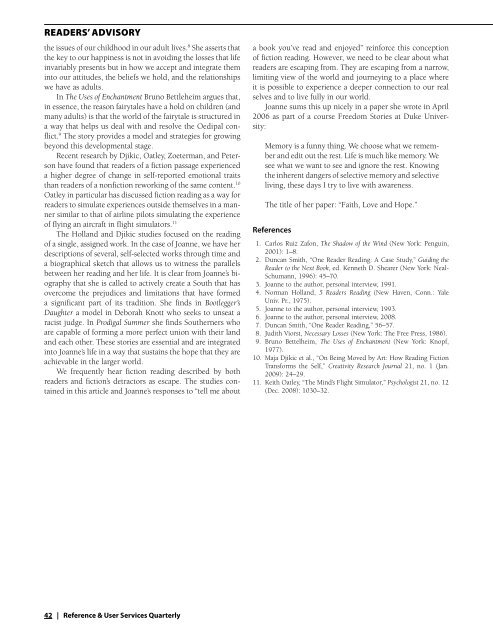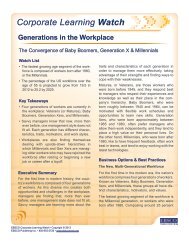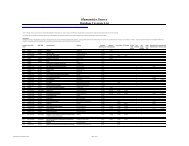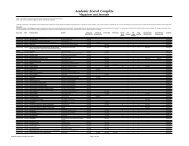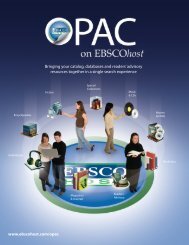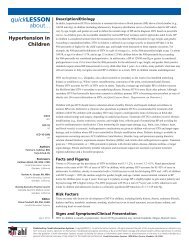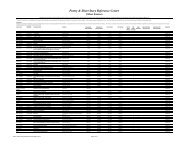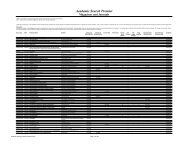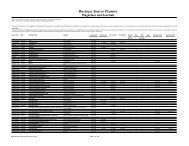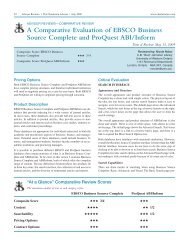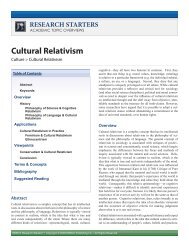your brain on Fiction - EBSCO Publishing
your brain on Fiction - EBSCO Publishing
your brain on Fiction - EBSCO Publishing
Create successful ePaper yourself
Turn your PDF publications into a flip-book with our unique Google optimized e-Paper software.
eaders’ advisorY<br />
the issues of our childhood in our adult lives. 8 She asserts that<br />
the key to our happiness is not in avoiding the losses that life<br />
invariably presents but in how we accept and integrate them<br />
into our attitudes, the beliefs we hold, and the relati<strong>on</strong>ships<br />
we have as adults.<br />
In The Uses of Enchantment Bruno Bettleheim argues that,<br />
in essence, the reas<strong>on</strong> fairytales have a hold <strong>on</strong> children (and<br />
many adults) is that the world of the fairytale is structured in<br />
a way that helps us deal with and resolve the Oedipal c<strong>on</strong>flict.<br />
9 The story provides a model and strategies for growing<br />
bey<strong>on</strong>d this developmental stage.<br />
Recent research by Djikic, Oatley, Zoeterman, and Peters<strong>on</strong><br />
have found that readers of a ficti<strong>on</strong> passage experienced<br />
a higher degree of change in self-reported emoti<strong>on</strong>al traits<br />
than readers of a n<strong>on</strong>ficti<strong>on</strong> reworking of the same c<strong>on</strong>tent. 10<br />
Oatley in particular has discussed ficti<strong>on</strong> reading as a way for<br />
readers to simulate experiences outside themselves in a manner<br />
similar to that of airline pilots simulating the experience<br />
of flying an aircraft in flight simulators. 11<br />
The Holland and Djikic studies focused <strong>on</strong> the reading<br />
of a single, assigned work. In the case of Joanne, we have her<br />
descripti<strong>on</strong>s of several, self-selected works through time and<br />
a biographical sketch that allows us to witness the parallels<br />
between her reading and her life. It is clear from Joanne’s biography<br />
that she is called to actively create a South that has<br />
overcome the prejudices and limitati<strong>on</strong>s that have formed<br />
a significant part of its traditi<strong>on</strong>. She finds in Bootlegger’s<br />
Daughter a model in Deborah Knott who seeks to unseat a<br />
racist judge. In Prodigal Summer she finds Southerners who<br />
are capable of forming a more perfect uni<strong>on</strong> with their land<br />
and each other. These stories are essential and are integrated<br />
into Joanne’s life in a way that sustains the hope that they are<br />
achievable in the larger world.<br />
We frequently hear ficti<strong>on</strong> reading described by both<br />
readers and ficti<strong>on</strong>’s detractors as escape. The studies c<strong>on</strong>tained<br />
in this article and Joanne’s resp<strong>on</strong>ses to “tell me about<br />
42 | Reference & User Services Quarterly<br />
a book you’ve read and enjoyed” reinforce this c<strong>on</strong>cepti<strong>on</strong><br />
of ficti<strong>on</strong> reading. However, we need to be clear about what<br />
readers are escaping from. They are escaping from a narrow,<br />
limiting view of the world and journeying to a place where<br />
it is possible to experience a deeper c<strong>on</strong>necti<strong>on</strong> to our real<br />
selves and to live fully in our world.<br />
Joanne sums this up nicely in a paper she wrote in April<br />
2006 as part of a course Freedom Stories at Duke University:<br />
Memory is a funny thing. We choose what we remember<br />
and edit out the rest. Life is much like memory. We<br />
see what we want to see and ignore the rest. Knowing<br />
the inherent dangers of selective memory and selective<br />
living, these days I try to live with awareness.<br />
The title of her paper: “Faith, Love and Hope.”<br />
References<br />
1. Carlos Ruiz Zaf<strong>on</strong>, The Shadow of the Wind (New York: Penguin,<br />
2001): 1–8.<br />
2. Duncan Smith, “One Reader Reading: A Case Study,” Guiding the<br />
Reader to the Next Book, ed. Kenneth D. Shearer (New York: Neal-<br />
Schumann, 1996): 45–70.<br />
3. Joanne to the author, pers<strong>on</strong>al interview, 1991.<br />
4. Norman Holland, 5 Readers Reading (New Haven, C<strong>on</strong>n.: Yale<br />
Univ. Pr., 1975).<br />
5. Joanne to the author, pers<strong>on</strong>al interview, 1993.<br />
6. Joanne to the author, pers<strong>on</strong>al interview, 2008.<br />
7. Duncan Smith, “One Reader Reading,” 56–57.<br />
8. Judith Viorst, Necessary Losses (New York: The Free Press, 1986).<br />
9. Bruno Bettelheim, The Uses of Enchantment (New York: Knopf,<br />
1977).<br />
10. Maja Djikic et al., “On Being Moved by Art: How Reading Ficti<strong>on</strong><br />
Transforms the Self,” Creativity Research Journal 21, no. 1 (Jan.<br />
2009): 24–29.<br />
11. Keith Oatley, “The Mind’s Flight Simulator,” Psychologist 21, no. 12<br />
(Dec. 2008): 1030–32.


